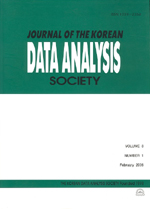Attitudes toward Treatment and Decisional Conflict in Cancer Patients Receiving Chemotherapy in Korea
- 한국자료분석학회
- Journal of The Korean Data Analysis Society (JKDAS)
- Vol.18 No.4
-
2016.081829 - 1844 (16 pages)
- 18

This study aimed to explore patients’ attitudes (length of life and quality of life) toward treatment by chemotherapy and to identify the factors relevant to the decisional conflict experienced when considering whether to undergo such treatment. This study was of a cross-sectional and descriptive design. A total of 120 chemotherapy patients were enrolled. A structured questionnaire for sociodemographic and health-related characteristics, the quality quantity questionnaire (QQQ), and the decisional conflict scale (DCS) were utilized. The data were analyzed by the PASW 18.0 program using descriptive statistics, the independent t-test, one way ANOVA, the Pearson correlation coefficient, and simultaneous multiple regression. The mean score for length of life was higher than that for quality of life (14.22±3.83 vs. 12.95±3.14), and the level of decisional conflict was low (28.68±11.16, range: 0-100). The significant factors related to decisional conflict were doctors’ involvement (β=.307, t=3.350, p=.001), length of life (β=-.265, t=-3.109, p=.002), and religion (β=-.251, t=-3.044, p=.003), which explained 24.8% of the variance. In cases of doctors’ involvement in decision-making, the level of decisional conflict was higher. When preferring length of life to quality of life or when having religion, the level of decisional conflict was low.
1. Introduction
2. Purpose
3. Methods
4. Results
5. Discussion
6. Conclusion
References
(0)
(0)